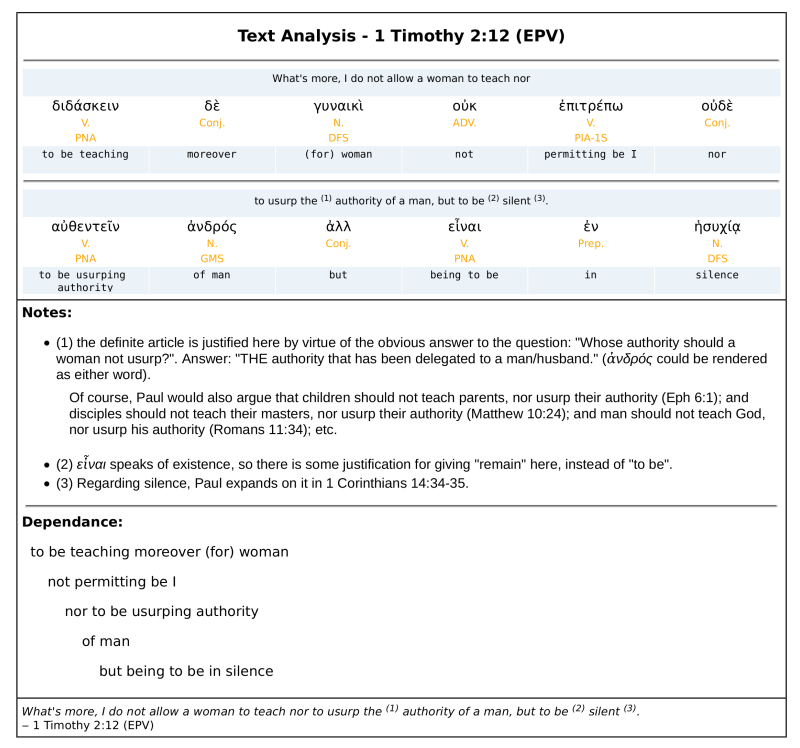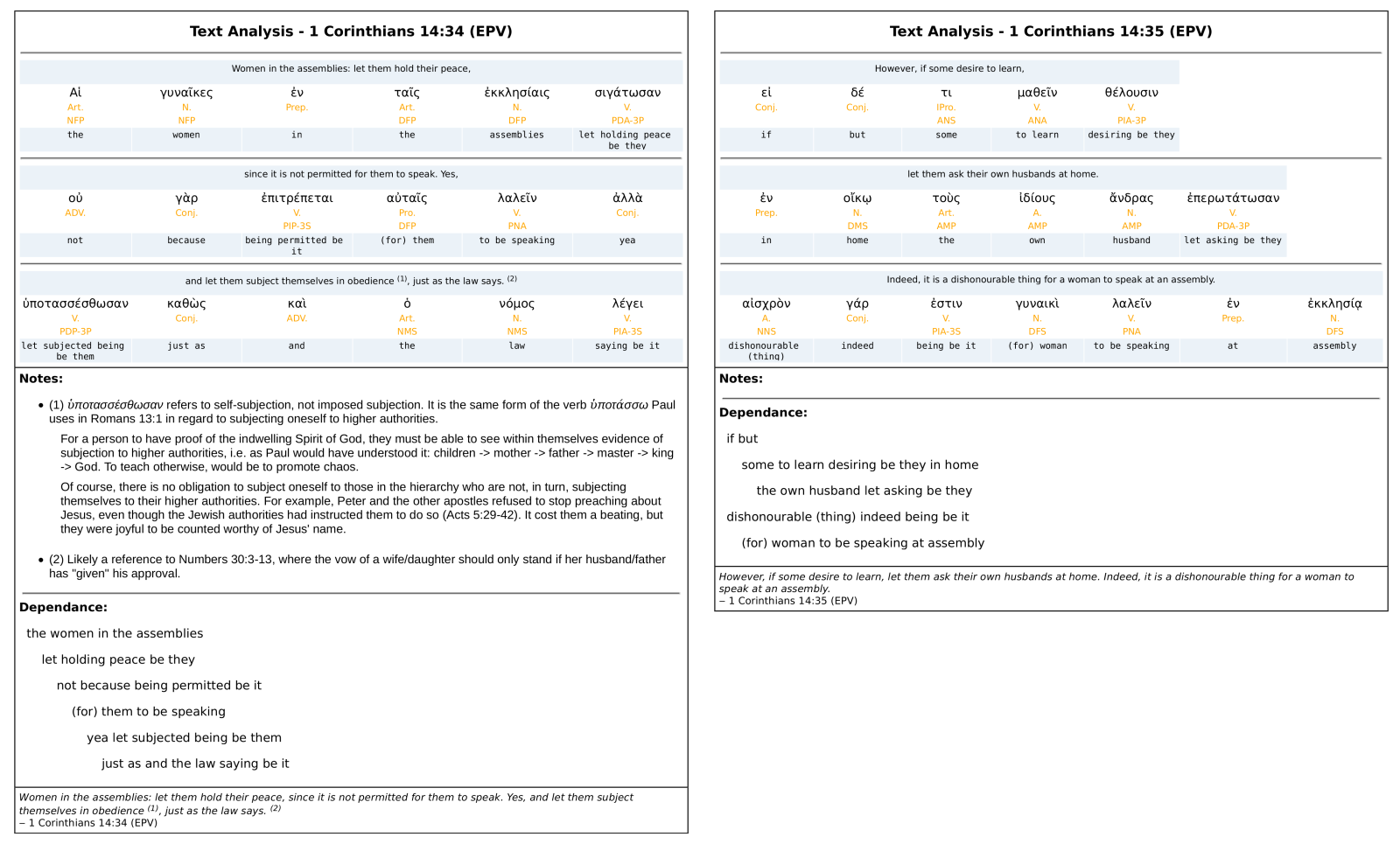At the least, the present tense informs the reader that the apostle Paul did not permit women to teach or have authority over a man at the time he wrote the epistle—and obviously shortly thereafter when those to whom the epistle was addressed would read it. But whether that prohibition was temporary or permanent, the tense alone does not convey.
In the original post, there is occasional mention of the word “imperative,”1 which might suggest to some that the apostle Paul actually used a verb conjugated in the imperative mood (this mood is used for commands). To be clear, the verb ἐπιτρέπω is conjugated in the indicative mood rather than the imperative mood. The indicative mood is typically used to state facts.2
If the apostle Paul had used the aorist tense, it would suggest that prohibition applied in the past but no longer applied in the present. Had he used the future tense, it would suggest that the prohibition would apply in the future but no longer applied in the present. The apostle appropriately used the present tense because the prohibition applied at that present time.
But, did the prohibition cease—or rather, did the apostle Paul intend for it to cease?
If the prohibition were to cease, what would be the impetus of the cessation? What would happen with the relationship between men and women that would allow women to become teachers and have authority over men? Has anything changed since the apostle Paul authored the epistle to nullify the prohibition? One verse later, the apostle Paul remarked,3
13 For Adam was formed first, then Eve. 14 And Adam was not deceived, but after the woman was deceived, she was in the transgression.
ΙΓʹ Ἀδὰμ γὰρ πρῶτος ἐπλάσθη εἶτα Εὕα ΙΔʹ καὶ Ἀδὰμ οὐκ ἠπατήθη ἡ δὲ γυνὴ ἀπατηθεῖσα ἐν παραβάσει γέγονεν TR, 1550
Here, we see that the prohibition is based on something that occurred near the onset of creation: Eve’s transgression by the serpent. As a result, it is written,4
16 To the woman He said, “I will greatly multiply Your pain in childbirth, In pain you will bring forth children; Yet your desire will be for your husband, And he will rule over you.” NASB, 1996
We must then reason that this prohibition is still binding to this day.
- The divine prescription in Gen. 3:16 establishes husbands as masters of their wives.5
- In 1 Tim. 2:13–14 cp. 1 Cor. 14:34, the apostle Paul reaffirms the divine prescription in Gen. 3:16.
Perhaps the only argument against the divine prescription would be that the relationship between men and women in Christ has changed so as to no longer warrant it. In response to this, we need only recognize that the apostle Paul was writing to Christians—those who had been regenerated (born again). Accordingly, the apostle Paul himself did not believe that even regeneration nullified the divine prescription.
Many commentaries acknowledge that 1 Tim. 2:12 has a parallel in 1 Cor. 14:34–35:6
14 Let your women keep silent in the churches, for they are not permitted to speak; but they are to be submissive, as the law also says. 15 And if they want to learn something, let them ask their own husbands at home; for it is shameful for women to speak in church. NKJV, 1982
Yet, women were evidently allowed to speak in Church, e.g., for prophesying or praying.7 Thus, the apostle Paul did not prohibit women from speaking in Church at all times. Rather (and I am aware of the tomes written on 1 Tim. 2:12), he prohibits them from being bishops, since bishops were the ones charged with both teaching and supervision of (i.e., authority over) the Church.8 Thus, “remain silent” is to be understood as a prohibition of speaking for the purpose of teaching others—a responsibility of bishops, who were only to be men.9
Since bishops still exist, the prohibition still applies to this day. However, to reiterate, the tense alone cannot convey this. Rather, it is the context that must be appreciated.
References
Alford, Henry. The Greek Testament. Vol. 3. Boston: Lee, 1878.
Huther, Johann Eduard; Lünemann, Georg Konrad Gottlieb. Critical and Exegetical Handbook to the Epistles to Timothy and Titus, and to the Epistle to the Hebrews. Trans. Hunter, David; Evans, Maurice J. New York: Funk, 1885.
Mounce, William D. Basics of Biblical Greek Grammar. 3rd ed. Grand Rapids: Zondervan, 2009.
Footnotes
1 viz., “a temporary imperative”; “timeless universal imperative”
2 Mounce, §16.1. It is actually true that there is a distinction between aorist and present imperatives with respect to the action of the verb, but since ἐπιτρέπω is conjugated in the indicative mood, such is irrelevant to the discussion at hand.
3 1 Tim. 2:13–14
4 Gen. 3:16
5 1 Cor. 11:3; Eph. 5:22, 5:24; Col. 3:18; 1 Pet. 3:1, 3:6 cp. Gen. 18:12
6 Huther, p. 105; Alford, p. 319
7 1 Cor. 11:5
8 1 Tim. 3:2
9 ibid.

